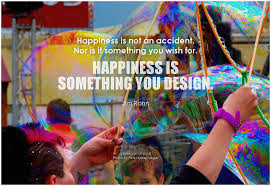Happiness May Save Your Life
There has been so much reporting of tragedy, hurt, pain, and suffering recently that I have found myself joining in the familiar mantra of gloom misery and despair that friends, colleagues all repeat on a regular basis. It now almost feels obscene to express joy or happiness anymore.
There is no question that very many people are being impacted and affected daily by a variety of pain, sorrow and loss, and compassion must be shown to them. However, there are also many other people who have made complaints and unhappiness the order of the day.
The truth of the matter is that happiness is a state of the mind. You have the freedom to choose happiness; it's as simple as that. The great things of life are usually simple, dynamic and creative.
Begin now to choose happiness. This takes being mindful of a desire to be happy. Reverse the mantra of blame, accusations, condemnations and judgements. Avoid thoughts that are repeated regularly and that systematically sink into the subconscious mind and become habitual. Happiness is a habit.
2. The desire to be happy.
In order to be happy, you must sincerely desire to be happy. There was a time when almost every day when I woke up, I had a kick in my step and a smile on my face. As time progressed, I found that this state was becoming less instinctive and I literarily had to drag my thoughts and demeanour away from what I didn't want to one of joy and happiness.
This is not to say I was or am in denial of whatever challenges of my environment there might be to overcome. I'm simply making a choice in spite of that, to be happy.
There are people who have been depressed, dejected and unhappy for so long that even when something joyful or good happens to them, they have become accustomed to the old mental patterns of unhappiness that they do not feel comfortable being happy. They long for the former depressed unhappy state.
Many people choose unhappiness by entertaining bleak thoughts such as: 'everything is going to go wrong', 'I'm not going to succeed', everyone is against me', 'business is bad and going to get worse', and I never get any breaks'. Having this attitude of mind first thing in the morning will undoubtedly leave you feeling unhappy. Worse still, it leaves you unavailable and unprepared for the opportunities that may come your way that day.
Begin to realize the world you live in is determined largely by what goes on in your mind. The thoughts you habitually entertain in your mind have the tendency to actualize themselves in physical conditions. I am always amazed at how creative and productive I become when I take control of my thoughts and not allow them to run rampant and reckless; during which time I lose the ability to think intelligently.
3. Wealth in and of itself does not make a person happy.
Wealth in and of itself does not make a person happy, though it is also not a deterrent to happiness. Today, there are many people trying to buy happiness through material acquisitions. The key to happiness is in your thoughts and feelings. Too many people have the idea that it takes something artificial to produce happiness, whereas happiness is a mental and spiritual state.
Few of us will get through life without experiencing some episode of anxiety, anger, worry or depression. However, we can all learn to handle difficult emotions, the key is training our minds in compassion. Compassion towards ourselves and other people can help us heal our turbulent minds and enhance your well-being. Compassionate thinking is a skill, much like learning to play an instrument, something that can be enhanced with dedicated practice.
The practice of regulating thoughts and emotions can be useful for those prone to anxiety or depression and learning compassion for other people can help with gaining perspective. When we find compassion for others, in so doing we strengthen our characters and enhance our well-being. Nigeria is a country screaming for compassion for and by its people.
Recognizing that we are all mortal and imperfect and that is part of what we share as a human experience is an important part of compassion. Having compassion for others and ultimately ourselves means we honour and accept our humanness. Things will not always go our way. We will encounter frustrations and loss. We will make mistakes, fall short of our ideals, face big or small challenges and encounter personal failings. Having compassion allows us to be less judgmental of others as well as ourselves.
4. Happiness is the harvest of a quiet mind.
We need to anchor our thoughts on peace, prose, security, and possibly divine guidance. Negative thoughts and emotions sink to our subconscious and cause all kinds of difficulties and maladies in our life. When your attention wanders bring it back to the contemplation of your goals and the good in you. Make a habit of this and subsequently, you discipline your mind. This can be life-affirming.
Learning to adjust our thinking to be more compassionate involves a small but regular commitment to retraining our emotional distress enable us to handle and recover from our stress better. If people can activate their self-soothing system, through generating thoughts and images of kindness, they might be more likely to manage difficult feelings and will be less likely to engage in an unhelpful and destructive behaviour.
You have the freedom to choose a good or bad habit. To form a new habit, you must be convinced that it is desirable. Happiness is desirable!
5. Interpersonal relationship engineer happiness in one's life.
Interpersonal relationships are important and necessary for our continuous existence. Without them, our lives would have virtually no meaning or purpose. An interpersonal relationship provides companionship. No matter how self-reliant you are, you can't be alone or live in isolation.
As humans, we cannot avoid interactions with one another. Relationship with other humans is the most fundamental aspect of our lives because we are innately social, and are shaped by our experiences with others. Whether in the home, at work or any other place, we have acquaintances with people-casual or close-and maintain relationship everywhere we go.
A close association or acquaintance between one or two people that may be brief or enduring is called interpersonal relationship. The association may be based on love, solidarity, regular business interactions, or some other type of social commitment. Interpersonal relationships are formed in different contexts that can vary from marriage, family or kinship relations, friendship, relations with associates, work, neighbourhoods, and places of worship. These contexts account for the different types of interpersonal relationship: marriage, family, friendship, professional etc.










Comments
Post a Comment